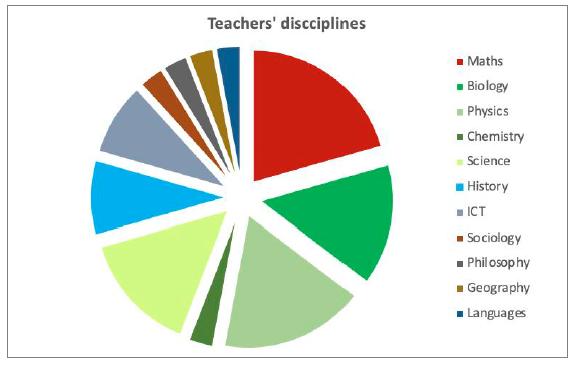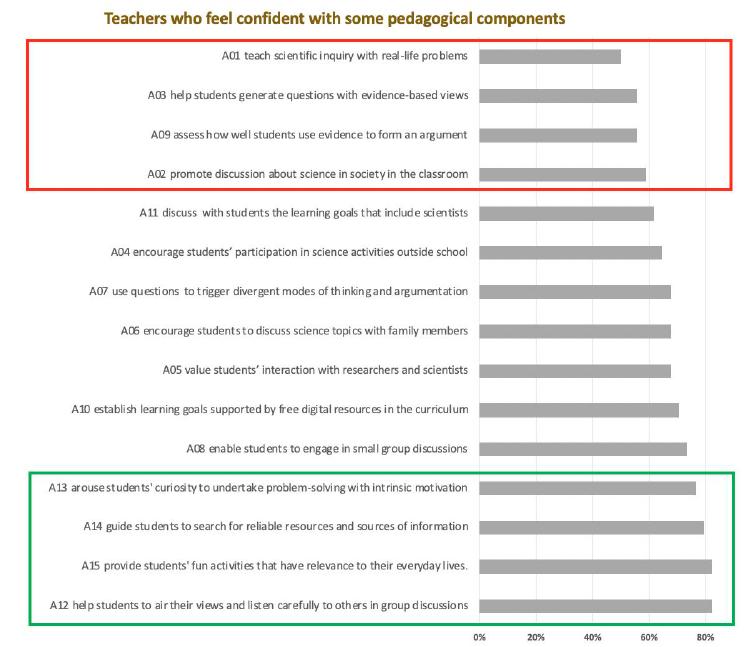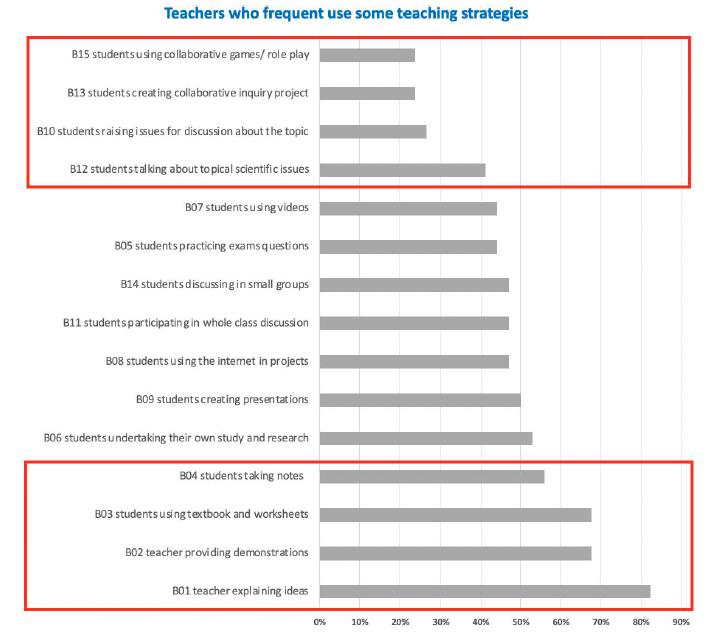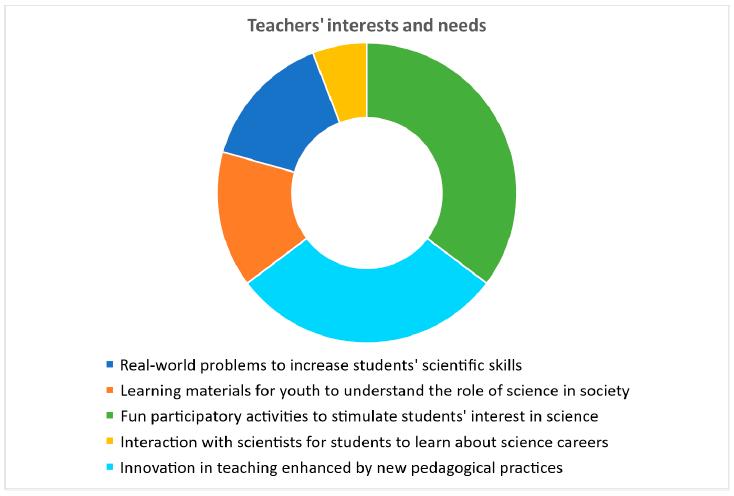Introduction
The education of this new decade requires innovation and expansion of teacher training programmes to improve their pedagogical practices in a transformative, engaging and responsive way, with the integration of new theories, technologies and pedagogical strategies. With the COVID-19 pandemic, the relevance of teacher training integrating emerging technologies became more evident. To support the training of academic educators and school teachers at local and national levels, extension programmes have an essential role in aligning scientific research and technological innovations with the priorities of educational communities and society.
The Brazilian extension programme aims to benefit the university and local society, contributing to the transformation of community members and the educational institution to better face the contemporary challenges towards justice, solidariety and democracy (FORPROEX, 2012). The university extension is an action that promotes the articulation between teaching and academic research with attention to the community's needs (MATTA; FURLANI, 2020). It is benefitial for national governments, universities and societies for four reasons. First provides an opportunity to promote thematic programmes developed in different universities at national level. Second, ensures fincancial resources for the execution of related public policies. Third, recognizes, by the governments, that the extension university is not just an academic activity but also a research and innovation process that is educative, cultural, political and scientific. Fourth, empowers societies to interfere in the solution of major social problems (FORPROEX, 2012). So that, the extension university is congruent with science with and for society which is participatory and open as well as Responsible Research and Innovation (RRI), whose aim is scientific development towards societal needs that interacts with society to minimize risks and maximize benefits (EUROPEAN UNION, 2018). The interaction between universities, schools and the local population for better address societal challenges, which was recent denominated “open schooling” is vital in the planning, process and results of participatory and open science for RRI (OKADA; RODRIGUES, 2018) and extension programmes (MATTA; FURLANI, 2020) to make them sustainable.
This study explores the open schooling approach promoted by the European Union that focuses on integrating formal, non-formal and informal learning through cooperation between students, scientists and communities to solve real life problems. This approach has emerged recently to better prepare future generations for life and the labour market in particular STEM - Science, Technology, Engineering and Maths aligned with RRI. "Open schooling" consists of an innovative and open curriculum that considers the partnership between school, university and community for learners with experts to discuss local problems and possible solutions supported by teachers and family members.
Recent literature highlights that open education and students-centred approaches, including self-regulated learning, suit professional and vocational fields, however these modalities are not fully embraced by educators due to their adherence to traditional ways of teaching as well curriculum demands and pressures (SHIKALEPO and HAUTEMO, 2021; JOSSBERGER et. al., 2020). Conversely, traditional teaching-centred approaches are not compatible with open schooling that focuses on more actively and meaningfully learning based on authentic contexts that are useful for youth' personal and professional lives (OKADA; RODRIGUES, 2018).
To explore this gap, this paper explores “teachers' education to innovate technical and technological professional learning of young professionals of the future”. This study, therefore, focuses on examing teachers' current pedagogical practices, teaching strategies and challenges that can facilitate or be facilitated by the open schooling approach.
We seek the answer to the following questions: (1) “How confident are teachers with open schooling's pedagogical components and teaching strategies for innovating their practices?” and (2) “What are teachers' interests and needs related to the novel open schooling approach?”. The aims of this study are to understand teachers' existing practices and current needs as well as identify the drivers, challenges and recommendations for them to embrance open schooling through partnerships between extension programmes for professional education and the open schooling project CONNECT (connect-science.net).
Open Schooling for Professional Education
The term "open schooling" emerged in 2015 in the report promoted by the European Union "Science Education for Responsible Citizenship" (HAZELKORN et al., 2015), which highlights the role of science, including scientific skills as a central axis in educating young people to investigate, intervene and innovate in a responsible and responsive way. Students' scientific skills provide students with invaluable opportunities to improve their lifelong learning, academic performance, confidence and interest in STEM careers (BICKFORD et al., 2020).
Open schooling refers to "schools, in cooperation with other stakeholders, become an agent of community well-being shall be promoted; families should be encouraged to become real partners in school life and activities; professionals from enterprises and civil and wider society should actively be involved in bringing real-life projects to the classroom. Relevant policymakers should also be involved to encourage policy buy-in and the mainstreaming of good practices and insights into policies, and hence sustainability and impact beyond the lifetime of funding. Partnerships that foster expertise, networking, sharing and applying science and technology research findings across different enterprises (e.g. start-ups, SMEs, larger corporations) should be promoted. Gender, socioeconomic and geographic differences are considered" (EUROPEAN UNION, 2018).
The scientific literature about open schooling is still limited, as it refers to a recent approach. Although most initiatives are focused on Europe, there are two projects, including Brazilian schools, universities, and civil society - ENGAGE and CONNECT (Table 1).
Previous studies about Open Schooling (OKADA; SHERBORNE, 2018) highlighted that some pedagogical components, teaching strategies and learning activities suggested by ENGAGE educational materials helped teachers foster students’ scientific skills for RRI (see examples Table 2 and Table 3).
These studies of ENGAGE project suggest that open schooling provided to students an opportunity that they have not had before to discuss the role of science with and for society. Students increased their awareness of the importance of science projects to promote sustainability, well-being, and social, environmental, and business prosperity. School students supported by teachers, families and researchers were engaged to develop informed views about socio-scientific issues and ways to explore alternative solutions considering different perspectives from scientists, researchers and family members.
Table 1 Open Schooling Projects funded by the European Union.
| Period | Projects | Description | Goal |
|---|---|---|---|
| 2015-2017 | ENGAGE | Equipping next generation for active engagement with science | Increasing youth awareness of RRI with real socio-scientific issues inquiry-based learning. |
| 2017-2020 | OSOS | Open schooling for open societies. | Transformation of schools into innovative ecosystems linked to major social challenges. |
| 2019-2022 | SEAS | Science education for action and engagement towards sustainability. | Advancement of scientific literacy for responsible citizenship. |
| 2019-2022 | PULCHRA | Building participatory urban learning community hubs through research and activation. | Strengthening science education through community partnerships "cities as urban ecosystems". |
| Period | Projects | Description | Goal |
| 2019-2022 | PHERECLOS | Partnerships for pathways to higher education and science engagement in regional clusters of open schooling. | Engagement of children and young people with academic research. |
| 2019-2022 | OSHub | Open science hub network: empowering citizens through steam education with open schooling. | Scientific education of communities for their sustainable development using RRI. |
| 2020-2023 | SALL | Schools as living labs. | Research and demonstration projects in outdoor spaces in food for sustainability contexts. |
| 2020-2023 | MOST | Meaningful open schooling connects schools to communities. | Partnerships to promote scientific competencies with community projects from the environmental school. |
| 2020-2023 | Make it Open | Make it open. | Opening up of school learning through maker education. |
| 2020-2023 | CONNECT | Inclusive open schooling through engaging and future-oriented science. | Formal and informal education with gamified scientific action in the curriculum and fun, participatory science. |
| 2021-2024 | COSMOS | Creating organisational structures for meaningful science education through open schooling for all | Creation of communities of practice (COP) on relevant socio-scientific issues. |
| 2021-2024 | MultiPlayers | Multiplayers' partnerships to ensure meaningful engagement with science and research. | Open scientific communities with open community events for data collection and decision-making processes. |
| 2021-2024 | Pafse | Partnerships for science education. | Preparing communities to reduce the risk of communicable diseases and epidemics. |
Source: First author.
Teachers of ENGAGE project used a varied of pedagogic components and teaching strategies suggested by the educative materials (Table 2 and Table 3) as well different emergent technologies such as inquiry games, Augmented Reality (OKADA et al., 2018), LiteMap - collective intelligence application tool (ROCHA et al., 2017; PINTO et al., 2018), APPs and social media (TORRES et al., 2017).
Table 2 Open schooling - Components, Strategies, and Scientific Skills (Example 1)
| ENGAGE Educational material 1: Should we Ban sugary drinks? | ||
|---|---|---|
| Educative Materials with pedagogical components | Teaching-Learning Strategies | Scientific skills for RRI (OKADA; SHERBORNE, 2018) |
| Teachers start a discussion about science in society: “Now that scientists have discovered that sugar is like an addictive drug, pressure is building for action to reduce the amount of sugar that children and young people consume in sugary drinks”. Teachers teach scientific inquiry with real-life issues about nutrition and health. Teachers assess how well students use evidence to form an argument and and craft scientific narratives for causal links between sugar consumption, obesity and disease. |
Students raise issues about nutrition and digestion - about the consequences of imbalances in the diet, including obesity. Students talk about diseases influenced by nutrition with their family. Students use a game to sort strong and weak evidence that sugar causes obesity and to decide if there is enough evidence to ban sugary drink sales to under-18s. Students have to use evidence to weigh up arguments for and against banning sugary drink sales to under-18s. Students create a presentation (plenary) to show their decision on the ban or not sugary drinks with expert professionals. |
Devise questions: define a clear scientific question that investigates cause or correlation relationships between different factors. Estimate risks: measure risks and benefits by assessing its probability, weighing up and combining its probability and the scale of its impact. Analyse patterns: interpret observations and data in a variety of forms to identify patterns and trends by making inferences and drawing conclusions. Draw conclusions: decide whether the claim made by a piece of research is supported by sufficient data. Justify opinions: synthesise scientific knowledge, implications, and value perspectives into an informed opinion with evidence-based arguments. |
Source: ENGAGE (https://www.engagingscience.eu/en/2015/10/24/ban-cola/) CC BY-SA.
Congruent to contemporary thinking (HODSON, 2003), education expands and becomes more valuable with open schooling and RRI, whose aim is to align scientific and technological knowledge with the needs of society through interaction between researchers, entrepreneurs, apprentices and educators to increase the number of innovative professionals and citizens scientifically literate (EUROPEAN UNION, 2020). Educational materials explicitly designed to promote open schooling with pedagogical components, teaching strategies, learning activites and learning objectives (inquiry skills for RRI) can facilitate teachers’ role to enhance and/or innovate their practice when using open schooling. This interaction between students and experts supported by teachers for the professional education with open schooling enables learners to be better prepared for decision-making on key social, political, economic and environmental issues (table 3) that affect individual and collective life - both global and local - facing the complexity and uncertainty of the contemporary world (MORIN, 2001).
Table 3 Open schooling Components, Strategies, and Scientific Skills (Example 2).
| ENGAGE Educational material 2: Should ECO-PHONES replace smartphones? | ||
|---|---|---|
| Educative Materials with pedagogical components | Teaching-Learning Strategies | Scientific skills for RRI (OKADA; SHERBORNE, 2018) |
| Teachers use a question to trigger divergent modes of thinking and argumenta-tion: “Shall eco-phone replace smartphones? As the number of smartphone users worldwide exceeds 2 billion, and as users update their devices with ever-increasing frequency, there are growing concerns about the impacts of smartphone manufacture and disposal on the environment and human health”. Teachers help students to air their views and listen to others in order to work out how to persuade phone manufacturers to make eco-friendly smartphones from sustainable materials. |
Students discuss in a small group about socio-scientific issue (dilemma) Students use role-play to reflect on issues arising from manufactures and disposal of smartphones and recycling of some materials. Students raise questions to talk about the topic in a whole-class discussion using knowledge about Earth resources Students undertake their own study and research by applying their working scientifically skills Student-led presentation to communicate findings and recommendations to a group of smartphones manufacturers. |
Interrogate sources: assess the validity of different sources by judging its reliability. Critique claims: check strength (quality accuracy and sufficiency) of evidence provided and identify lack of clarity of justification. Examine consequences: evaluate the merit of a solution by identifying consequences regarding economy, society, and environment. Communicate ideas: describe opinions and accomplishments using the major features of scientific writing and speaking. Use ethics: understand and use ethical thinking to make informed decisions and explain why different people may have different viewpoints. |
Source: ENGAGE (https://www.engagingscience.eu/en/2016/10/01/ecophone/) CC BY-SA.
"CONNECT - Inclusive Open Schooling through engaging and future-oriented science", which, together with 8 institutions in Europe and two in Brazil, supports teachers' professional development through self-reflective instruments including engaging resources for teachers' educators, and open educational materials for multi-actors. CONNECT offers a multi-language platform, engaging toolkit to support multi-actors, open science scenarios and structured curriculum resources to integrate formal, non-formal and informal learning. CONNECT is underpinned by the CARE-KNOW-DO framework (OKADA & SHERBORNE 2018) designed to promote the integration between knowledge and skills acquired in and outside school for young people to learn in a more contextualised and useful way in their lives and future professional careers.
In formal learning, students learn in a structured and institutionalised educational environment, with explicit learning intentions in terms of goals, time or resources with learned knowledge to be validated and certified.
In non-formal learning, students learn in a less structured environment of networks, associations or cooperatives. Planned activities are more flexible with a learning purpose and intent, but do not always contain the learning objectives, learning time, or learning support and assessment in an explicit way.
In informal learning, students learn unintentionally in their daily lives in activities related to work, family or leisure that were not planned or structured in terms of goals, time, resources or support.
Informal learning emerges from what subjects are interested in real-world contexts and allows them to explore and derive their own understanding. In formal learning, that is, in the traditional way of teaching, this order is reversed, knowledge comes first and interesting real-world applications only follow later. (OKADA; RODRIGUES, 2018).
Pedagogical mediation in open schooling requires that formal, non-formal and informal educators select approaches - techniques, methods and resources - that favour the co-learning process of students in a more integrated way, encompassing the different dimensions of learners - intellectual, attitudinal and affective.
This study investigates the teacher training of an extension course aiming to prepare teachers to innovate their pedagogical practices in a self-reflective way with emerging technologies and a socio-scientific perspective integrated with their didactic strategies through open schooling. The innovation of teaching practice to integrate learning with responsible research and innovation is a key factor for this decade's education towards a desirable future for all generations.
Methodology: an exploratory case study
The "Emerging Technologies" extension project consists of a series of inclusive actions for training teachers in education, including courses with online modules nationwide. The project's target audience is teachers who work in basic education with graduation in any area of knowledge.
In this project, more than 400 teachers were certified in the last four years (MATTA; FURLANI, 2020) using principles developed in ENGAGE open schooling initiave. Three courses are currently offered: (1) Emerging Technologies, (2) Collaborative Technologies and (3) Visual Knowledge Mapping, with 40 hours of workload, each course. The organisation of the course in small modules has favoured the permanence and completion of participants (MATTA; FURLANI, 2020; MATTA; FURLANI; OLIVEIRA, 2016).
The strategies adopted for the courses of the "Emerging Technologies" project are: reading with reflections through forums, collaborative work, use of online applications, application of knowledge acquired in the classroom and communication of results in the forums. These courses also involve CONNECT concepts and features, such as producing a didactic sequence that involves a socio-scientific dilemma with real-issues supported by CARE-KNOW-DO framework and self-reflective instruments for teachers. Figure 1 shows this confluence: in the centre (in green), the dynamics of the course are illustrated, and around the CONNECT, open educational resources on open schooling (in grey and blue) are presented.
The innovative concept of science capital (ARCHER, 2014) explores the factors that influence young people's aspirations for science-based careers and the conditions that can help disadvantaged students believe that "science is for me." Science capital can be thought of as a kind of "pocket" in which learners accumulate experiences (here called factors), such as knowledge, skills, attitudes, values and contacts throughout life. The more factors, the greater the scientific capital and the greater the likelihood for students to aspire to science-based careers. The factors can be grouped into four dimensions congruent with the CARE-KNOW-DO framework: (1) how learners think (How relevant is science to everyday life? What socio-scientific issues do they care?), (2) what they know (knowledge, skills and awareness fro problem solving and also about future professional careers ), (3) what they do (talk about or do science?) and (4) whom they know (scientists, scientifically literate citizens, communities).
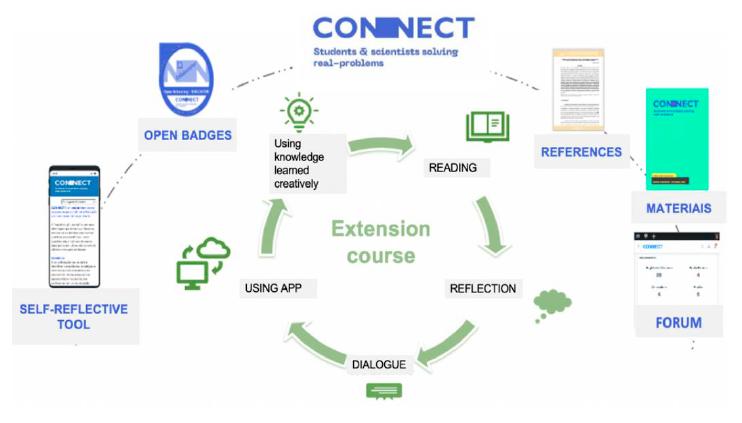
Source: The authors.
Figure 1 Strategies adopted in an extension project supported by open schooling.
CONNECT self-reflective instrument uses the five dimensions of the teaching practices model (Table 4), which is designed to promote science education for citizenship underpinned by various scholars (BARTHOLOMEW; OSBORNE; RATCLIFFE, 2004; RATCLIFFE; GRACE, 2003).
This model suggests five dimensions for self-reflection of practices with a set of categories for two groups: teachers who consider themselves beginners or experienced. The model was extended with a third group called "open school teachers" for those who have a greater domain to educate students with knowledge about science, the nature of science; and, science with and for society (OKADA, 2021).
The five dimensions were used to interpret participants' responses and provide personalised feedback immediately upon submission of responses, sent both on-screen and via email; including an open schooling study collaborator badge; and, also two recommendations to enrich teacher education: (1) access videos related to the dimensions for beginning teachers (whose indicator was 1 to 5) and (2) sharing practices for the dimensions of experienced teachers in the padlet-mural (whose indicator was indicator was 10 to 15), as shown in Figure 2.
Table 4 Indicators for teaching practices model for open schooling.
| Dimensions needed to transform practices | Beginner Teachers | Teachers experienced | Teachers of open education |
|---|---|---|---|
| D1. Understanding the nature of science and learning based on real socio-scientific questions. | Looking forward to your understanding. | Confident about your understanding. | Expert about science with and for society. |
| D2. Teachers' conception of their role. | Knowledge transmitter. | Learning facilitator. | Partner of students and scientists with society. |
| D3. Use of scientific discourse by teachers | Closed and authoritative. | Open and dialogic. | Co-built based on evidence. |
| D4. Teacher's conception of learning objectives. | Evaluates knowledge gains. | Examine knowledge and skills. | Support the skills development. |
| D5. Reflection on the nature of classroom learning activities | Imposed activities and artificial. | Authentic activities chosen by students. | Activities with partnerships and students as protagonists to expand scientific capital. |
Source: Okada (2021).
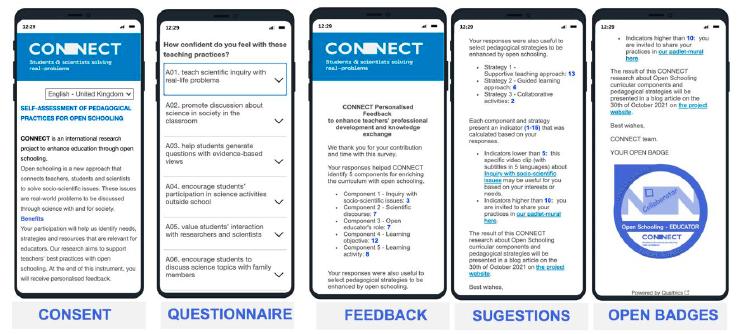
Source: Developed by the CONNECT project (OKADA, 2021)
Figure 2 Reflective teaching instrument for open schooling of the CONNECT project.
In the current course, the self-reflection application approved by the ethics committee code 8245 was used, making it possible to generate quantitative and qualitative data. This application for mobile devices was developed by first author part of the CONNECT project and used as an instrument for teachers and course organisers of the extension project “Emerging technologies” to identify the components and strategies that can present facilities or challenges to be improved with open schooling.
The instrument has a set of reflective questions that use the Likert scale and then three open questions that invite respondents to share pedagogical practices that involve students interacting with scientists; problems that can engage students with research through curiosity and interest; and closing comments.
This instrument was developed to guide teachers to promote students' confidence, competence, and aspirations to use scientific skills in their science actions as future researchers and citizes guided by formal teachers; non-formal scientists instructors and informal family educators.
This instrument contains three steps: (1) consent to generate anonymous data, (2) reflective questionnaire with 30 items with an average response time of 5 minutes, 3 optional open questions and (3) feedback with a personalised suggestion of videos and exchange of practices.
The invitation was sent by email to 300 teachers of the "Emerging Technologies". Among the invited educators course-members , 34 volunteers participated in the study (21 women and 13 men). The profile of the respondents is shown in Figure 3. The participants consisted of 27 in-service teachers, 5 in-training teachers, and 2 in the "other" category - research teachers.
Most teachers work in the areas of science, technology, engineering and mathematics, known as STEAM (English: Science, Technology, Engineering Arts/Humanities and Mathematics): 5 in Sciences, 5 in Biology, 6 in Physics, 1 in Chemistry; 7 from Mathematics, 3 in History, 1, in Geography, 1 in Languages, 1 in Philosophy, 1 in Sociology and 3 in ICT (Technology, Computing, Programming).
Results
In terms of drivers for open schooling, the study revealed four pedagogical components that many teachers feel confident about (Figure 4 in green): 82% of teachers help students express their views and listen carefully to others in group discussions, 82% provide fun activities that have relevance to students’ lives; 79% guide students in their search for reliable information resources and sources; and, 76% arouse students’ curiosity to undertake problem-solving with instrisic motivation.
To analyse the challenges with open schooling, the results (Figure 4 in red) highlight four pedagogical components that only half of teachers feel confident about: 50% of teachers teach scientific inquiry with real-life problems; 56% help students generate questions with evidence-based insights; 56% assess how well students use evidence to form an argument and 59% promote discussion about science in society in the classroom. In addition, the four teaching strategies by which a few teachers few confident about are (Figure 5 in red): only 24% of teachers provide opportunities for students to use collaborative games and role-sharing; only 24% support students creating collaborative research projects only 26% engage students to raise issues for disussion about the topic; and 41% enable students to talk about topical scientific issues.
Congruently to these challenges, findings suggest that there is a large number of teachers focussed on more traditional and transmissive way of teaching (Figure 5 in red): teachers explain ideas (82%); teachers provide demonstrations (68%); students using textbook and worksheets (68%) and students taking notes (56%).
In addition to quantitative data, this study analysed qualitative data that indicated teachers' open schooling practices for students to interact with experts on real issues. Findings suggests eight types of practices ordered from most to less interactive: (1) young scientist project between school and university; (2) ladybugs in agriculture investigations; (3) astronomy workshop for creating rockets and objects with experts; (4) school science club [hands-on] (5) debate about societal issues prejudism, racism and inclusion (6) discussions about light pollution; (7) views about science in everyday life (8) consulting publications from Science today magazine for children.
Findings also revealed teachers’ suggestions about topics that engage students for open schooling: statistics on epidemiology, news without scientific basis (fake news), science called into question, the value of understanding science, the taste and fun for science, the sustainability in the countryside, the issue of sewage and climate change.
These findings from qualitative data were also complemented by quantitative data. Although there are 82% of teachers who feel confident to provide fun activities relevant for students’ lives; there are 35% whose priorital need/interest is fun participatory activities to stilumate students’ interest in science. There are 29% whose main interest is innovation in teaching enhanced by new pedagogical practices; 15% real-world problems to increase students' scientific skills; 15% learning materials for youth to understand the role of science in society; and only 6% interaction with scientists for students to learn about science careers (Fig. 6).
Finally, the comments of teachers related to this research were positive and indicate increased awareness towards open schooling, according to the following questions, interests and needs: “Can I develop this work for Early Childhood Education (4 to 6 years old)?”; “This interdisciplinary work is important.”; “I would like to know how to change practice to improve scientific knowledge”, “What are the training opportunities or courses?”; “I'm waiting for the next steps and the project to unfold, anxious for training.”; and “How can I deal with the lack of interest from young people in learning?”.
Discussion
The world has become unpredictable and complex (MORIN, 2001), truths have become transitory, and the critical and in-context connection of knowledge becomes increasingly relevant to the post-truth context. Teacher training to innovate their practices will be necessary to educate young people and adults in a world dominated by technology and extremely fast scientific advances, with an increasingly demanding and challenging professional market (FAWNS et al., 2021).
This study allowed us to highlight teacher education, focusing on teachers as self-reflective and transformative practitioners, aware of their practice and uncertainties for them to enhance and innovate their teaching with open schooling.
The individual and collective reflection of the results based on "Table 4 - Indicators for teaching practices for open schooling" was guided with five dimensions adapted and extended by Okada (2021) from literature studies (BARTHOLOMEW; OSBORNE; RATCLIFFE, 2004; RATCLIFFE; GRACE, 2003). These indicators and dimensions made it possible to present recommendations for the teaching respondents, for the mediators - trainers of educators and for the organisers of the extension course “Emerging Technologies” for professional education.
The first recommendation for teacher educators is to broaden the understanding of the nature of Science (HODSON, 2003) to transform education through three components. Teachers need to understand the characteristics of scientific inquiry with real problems in order to guide students to engage with current issues relevant to local and global society. It becomes necessary to guide teachers on how to promote the discussion about science in society; and how to guide students to generate questions and share evidence-based views (AIKENHEAD, 2006). For this, the discussion and practices of learning strategies with the use of collaborative games, division of roles and collaborative research with socio-scientific issues will be useful to implement open schooling (OKADA et al., 2019; OKADA; SHERBORNE, 2018).
The second recommendation is to expand the conception of teachers about their own role as open schooling educators supported three actions. First, teachers must encourage and value participatory science approaches for students inside and outside the school. Second, teachers must help students interact with experts and researchers in the professional market. Third, teachers must guide students to discuss the topic of science with members of their community including the family (EUROPEAN UNION, 2018). For this pedagogical dimension, some strategies can be useful, such as engaging students to reflect about science-in-the news at home and discuss videos and presentations provided by scientists on the subject, dialogue on current issues with professional researchers and their communities, allowing them to expand their scientific capital (ARCHER, 2014; ARCHER et al., 2015).
The third recommendation is to guide teacher to use scientific discourse to support students with evidence-based argumentation (KELLY, 2014). Teachers should provide more opportunities for students to participate in small group and whole class discussions. Teachers' questions should trigger divergent modes of thinking and argumentation, which enables an informed dialogue (MURPHY et al., 2018). So that, students will be better prepared to justify their views using arguments and evidence. In this way, the strategies that will enrich learning are those in which students can prepare presentations, participate in discussions with the whole class, and conduct studies through research.
This study indicated that teachers feel more secure with: setting learning goals and developing learning activities for open schooling.
In this sense, the fourth recommendation is to encourage teachers to share the practices they feel most confident about learning objectives achieved that were relevant for students to become scientifically literate. For example, teachers could describe how open education resources were selected and how they were related to curriculum objectives (KRAJCIK; MCNEILL; REISER, 2008). Teachers could present the learning objectives discussed with students that were supported by experts and family. In addition, they could explain how students interacted with local communities collaboratively and issues that they raised for discussion with opportunities to air their views and listen carefully to others.
The fifth recommendation refers to engaging teachers in reflecting on the nature of classroom activities. Learning activities centered on teachers' explanations, demonstrations and materials should be an initial step to move to towards students-centered approaches including also self-regulated learning for more active role to expand their problem-solving skills in new contexts with autonomy. Therefore the traditional and transmissive activites widely used by teachers should be enriched with opportunities for students to extend their understanding with scientists and family, increase their confidence and enjoyment in learning inside and outside school.
Teachers should also be encouraged to discuss their experiences about projects and actions carried out by students with involvement and interest; guidelines offered in the search for reliable information sources (ALLCHIN; ZEMPLÉN, 2020); and fun and engaging activities that are relevant to students' everyday lives (OKADA; SHEEHY, 2020). For this, the learning strategies used by students can be also shared, such as productive use of the internet for projects, their curiosity to undertake problem-solving, their own research and studies completed successfuly (MASSARANI et al., 2019).
Conclusion
The world led by science, technology, social, economic, environmental and political adversities, requires the preparation of youth as critical-creative citizens and innovative-responsible professionals. The continuing professional development of secondary, technical and vocational school teachers is vital for contemporary education of students through integrated learning (MACHADO, 2010; RAMOS, 2017), with opportunities for students to connect their formal, non-formal and informal learning in and outside schools (OKADA; RODRIGUES, 2018).
Education plays a vital role in preparing students with the competent knowledge, skills, attitudes and values to deal with the great global and local challenges that affect their lives and the planet. Adverse contexts, such as the pandemic, dramatically affect the labour market (IPEA, 2020). In this sense, the education of students requires new learning strategies to be prepared to transform challenges into opportunities of innovation arising from adversity situations (UNESCO, 2021). For this, it is necessary that professional, vocational, and technical schools enrich their curriculum with the use of relevant techniques, new methods and processes to empower youth as future citizens and professionals (HAZELKORN et al., 2015). Lifelong learning skills enhanced by open schooling (EUROPEAN UNION, 2018) enables youth to develop the ability to learn throughout life and professional careers.
To enhance the RRI in education, it is necessary that actors (apprentices and educators) take ownership of open schooling with interest and intrinsic involvement for autonomy resulting from the development of skills with the pleasure of learning through emancipatory fun (OKADA; SHEEHY, 2020).
Contemporary socio-scientific thought (HODSON, 2003) and transdisciplinary (MORIN, 2001) developed through open schooling is vital in different areas of work supported by responsible research and innovation (EUROPEAN UNION, 2020).
To facilitate the implementation of open schooling (EUROPEAN UNION, 2018), the results highlight the importance of identifying teachers' knowledge and teaching practices, challenges, interests and needs. This exploratory research confirmed that a key challenge for teachers is to innovate their traditional teaching to more students-centred approaches. A limitation of this mixed-method study is the limited number of participants (34) of only one extension university course. Studies with a representative number of participants in a national extension programme supported by various universities will be necessary to promote professional education innovation with policymakers.
In order to innovate these pedagogical practices, it is necessary to reflect on the didactic components and strategies that teachers are most insecure about, such as evaluation of socio-scientific argumentation, evidence-based questioning and research skills with current contemporary problems.
The innovation of teachers' pedagogies and students' learning strategies supported by new open schooling approaches as well online and offline technologies are highly relevant in a world in which hybrid education has quickly become a necessary practice in response to the global pandemic. This study highlights that teacher and student training in the contemporary context requires socio-scientific digital inclusion for reading the current world and rewriting a desirable future (FREIRE, 1969; HODSON, 2003).














